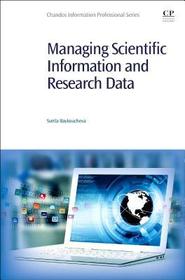
Managing Scientific Information and Research Data
-
20% KEDVEZMÉNY?
- A kedvezmény csak az 'Értesítés a kedvenc témákról' hírlevelünk címzettjeinek rendeléseire érvényes.
- Kiadói listaár EUR 56.95
-
23 620 Ft (22 495 Ft + 5% áfa)
Az ár azért becsült, mert a rendelés pillanatában nem lehet pontosan tudni, hogy a beérkezéskor milyen lesz a forint árfolyama az adott termék eredeti devizájához képest. Ha a forint romlana, kissé többet, ha javulna, kissé kevesebbet kell majd fizetnie.
- Kedvezmény(ek) 20% (cc. 4 724 Ft off)
- Kedvezményes ár 18 896 Ft (17 996 Ft + 5% áfa)
Iratkozzon fel most és részesüljön kedvezőbb árainkból!
Feliratkozom
23 620 Ft

Beszerezhetőség
Megrendelésre a kiadó utánnyomja a könyvet. Rendelhető, de a szokásosnál kicsit lassabban érkezik meg.
Why don't you give exact delivery time?
A beszerzés időigényét az eddigi tapasztalatokra alapozva adjuk meg. Azért becsült, mert a terméket külföldről hozzuk be, így a kiadó kiszolgálásának pillanatnyi gyorsaságától is függ. A megadottnál gyorsabb és lassabb szállítás is elképzelhető, de mindent megteszünk, hogy Ön a lehető leghamarabb jusson hozzá a termékhez.
A termék adatai:
- Kiadó Elsevier Science
- Megjelenés dátuma 2015. július 9.
- ISBN 9780081001950
- Kötéstípus Puhakötés
- Terjedelem162 oldal
- Méret 228x152 mm
- Súly 250 g
- Nyelv angol 0
Kategóriák
Hosszú leírás:
Innovative technologies are changing the way research is performed, preserved, and communicated. Managing Scientific Information and Research Data explores how these technologies are used and provides detailed analysis of the approaches and tools developed to manage scientific information and data. Following an introduction, the book is then divided into 15 chapters discussing the changes in scientific communication; new models of publishing and peer review; ethics in scientific communication; preservation of data; discovery tools; discipline-specific practices of researchers for gathering and using scientific information; academic social networks; bibliographic management tools; information literacy and the information needs of students and researchers; the involvement of academic libraries in eScience and the new opportunities it presents to librarians; and interviews with experts in scientific information and publishing.
TöbbTartalomjegyzék:
"
- Chapter 1. The Road from Chemistry-to Microbiology-to Information Science
- Chapter 2. Scientific communication in the digital age
- Chapter 3. Ethics in scientific publishing
- Chapter 4. An editor's view: Interview with John Fourkas
- Chapter 5. Finding and managing scientific information
- Chapter 6. Science information literacy and the role of academic librarians
- Chapter 7. Information literacy and social media: Interview with Chï¿1⁄2rifa Boukacem-Zeghmouri
- Chapter 8. Coping with ""Big Data"": eScience
- Chapter 9. Managing research data: Electronic Laboratory Notebooks (ELNs)
- Chapter 10. The complexity of chemical information: Interview with Gary Wiggins
- Chapter 11. Measuring academic impact
- Chapter 12. From the Science Citation Index to the Journal Impact Factor and Web of Science: Interview with Eugene Garfield
- Chapter 13. What it looked like to work at the Institute for Scientific Information (ISI): Interview with Bonnie Lawlor
- Chapter 14. Measuring attention: Social media and Altmetrics
- Chapter 15. Unique identifiers
- Chapter 16. Epilogue: Creating an information-literate generation of scientists




